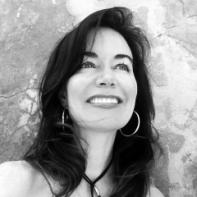Sarah Wetzel

Sarah Wetzel is the author of River Electric with Light, which won the 2013 AROHO Poetry Publication Prize and is forthcoming from Red Hen Press, and Bathsheba Transatlantic, which won the Philip Levine Prize for Poetry and was published in 2010. Sarah currently teaches creative writing at The American University of Rome while splitting time between Manhattan, Tel Aviv, and Rome. You can read more of her work at www.sarahwetzel.com.
The Past as Beautiful as I
It’s not as if I’ll stay in Rome forever.
Though I’ve tried to convince at least my lover
I’m the next Anna Magnani—that legendary she-wolf
of Italian neorealismo. Even near the end,
she could still cause a riot. I hover a little
outside this body. Yet I recognize the importance
of being alive, not just a ghost critiquing
the corpse, worrying she won’t make it back
in time for dinner. Anna Magnani, my lover said,
looked like a man. No, I said,
she laughed like a man. How we discover our beauty
is not insignificant.
It configures it.
That’s why it takes me three times as long
to reach the cobblestoned street where I live.
The graffitied doors and difficult lock.
Why I’m always looking for rivers.
Why I refuse taxicabs. I know one day I’ll stumble
upon the Piazza di Santa Maria, its fountain
rebuilt as it was
before miracles, the voice of Anna Magnani
demanding Qualcosa
di Magnifico!
Etude for Beginners
The rain continues in Rome
for its seventh day
which makes the water
seem religious
in the sense that I begin to believe
there’ll be no other season.
Meanwhile one story down
a dark-eyed girl of maybe seven or eight
with raggedy bangs
she probably cut herself
is practicing flute.
Over and over, she plays
an etude that I recognize
but can’t name.
The notes quickly run up until
she stumbles
reaching the same bar seventeen times
which is when
I stop counting.
Meanwhile my father turns eighty
and he calls me
from six thousand miles away
so that he can remind me
he’s dying. He phones just to hear
my voice. Every time I pick up
he says I sound
as though I’m only next door.
I’m no expert in etudes for children,
drills for beginners.
I’m no expert in ritual or rain.
I tell my father
I’m learning Italian.
Meanwhile the little girl, Anna or Annamarie,
has put down her flute.
It’s dinnertime and I imagine
a bowl of soup in front of her
that smells
her window to mine
of tomato or perhaps minestrone.
The two of them, the little girl
and her grandmother
who, now that I think of it,
is surely the one
cutting her granddaughter’s hair,
make up a game
in which they name
the birthplace of all their neighbors.
The girl tells her grandmother
the woman upstairs comes from a city
with the quietest, più chetavo
or maybe she said
the wickedest, più cattivo
houses or maybe she said trees
albergo albero, but anyway
the loneliest. Sometimes it’s hard
to know the difference.
Meanwhile Rome recovers her footing.
The rain pauses
and Anna or Annamarie begins
the etude again. Over and over
until I can’t forget
what lonely sounds like.

